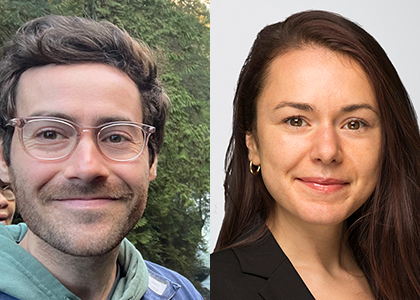A revolutionary concept: UCLA Law students forge careers in environmental clinics

In the fall of 2021, Sean Anderson ’22 walked into the first day of UCLA School of Law’s California Environmental Legislation and Policy Clinic and took on an assignment that would ultimately become his job — though he didn’t know it at the time.
The clinic is part of a suite of experiential opportunities that the Emmett Institute on Climate Change and the Environment offers, where students can develop a policy expertise in a hands-on law school clinical setting – and then go on to make that their specialty as attorneys.
In the California Environmental Legislation and Policy Clinic, Anderson and his classmates learned the nuts and bolts of the legislative process when they were paired with California state lawmakers to work on bills in Sacramento. And on that first day of class, Julia Stein – who runs the clinic and serves as the deputy director of the Emmett Institute – presented students with a handful of legislative proposals that they could choose to work on.
Anderson was drawn to a bill tackling plastic pollution. “I was fascinated with this idea of a circular economy and this vision of restructuring our system to address a problem that is as seemingly insurmountable as single-use plastic packaging waste,” he says. That’s how he and fellow students Kelsey Manes ’22, Reilly Nelson ’22 and Justin Breck ’23 joined a multi-year effort to comprehensively reduce plastic waste in California.
Their project paid off. In June 2022, Gov. Gavin Newsom signed the bill that they worked on, SB 54, into law. It created a strong regulatory framework over nearly every type of plastic packaging in the supermarket aisle, 90% of which was not being recycled. Phased in over time, the law sets a statewide target of recycling 65% of all single-use packaging and plastic food service ware by 2032 and requires that all single-use packaging and food service ware be recyclable or compostable by then.
“It also seeks to shift the pollution burden from consumers to producers,” Anderson says. He notes that SB 54 is an extended producer responsibility law, meaning it’s designed to require producers to take responsibility for what happens to their products at the end of those products’ usable lives.
That bill is just one example of how the Emmett Institute has made an impact through its clinics. In recent years, clinic students helped develop recommendations for stronger heat and air quality protections for agricultural workers, which informed AB 2243, while another team helped write AB 779, which seeks to make groundwater adjudications more equitable.
It was in another UCLA Law environmental law clinic that Emily Warfield ’20 was first exposed to the world of CEQA — the California Environmental Quality Act.
Warfield was a student in the Frank G. Wells Environmental Law Clinic, which gives students an opportunity to represent real-world clients in environmental cases. Before the clinic, she knew about CEQA’s reputation for slowing down development. She says, “I struggled to find housing as an undergraduate and beyond, so I became curious about the cause of the shortage. It seemed like everyone in California was yelling and pointing fingers at CEQA as the cause.”
In the Wells clinic, Warfield and a classmate helped draft an amicus brief in a CEQA appellate matter. She slowly became an expert in CEQA’s legal framework. “My clinic partner and I could take our time learning the relevant statutes, regulations and case law,” she says. “This helped us work together on language for the brief, which resolved that niche CEQA issue for the court.”
After graduating, Warfield went to a big law firm, advising housing developers on land use and environmental compliance matters, including CEQA matters. Now she’s an attorney at the California Department of Fish and Wildlife. “CEQA touches everything a public agency does, so the foundational knowledge that I built in private practice is extremely valuable here,” she says.
It's that foundational knowledge about single-use plastics that came full circle for Sean Anderson in the fall of 2023. That’s when Anderson was applying for an attorney position at CalRecycle, the state agency that oversees recycling and waste reduction. The job’s focus: supporting implementation of SB 54, the very bill he helped draft. When it came time to interview for the job, he explained that he would love to help implement that landmark law.
How did the interview go? “The team was thrilled that I had background experience with the law, to be able to begin on day one with that foundational knowledge,” he says.
“I’m very grateful to UCLA and the environmental program, where I could stand out,” Anderson says. “I’m where I want to be.”